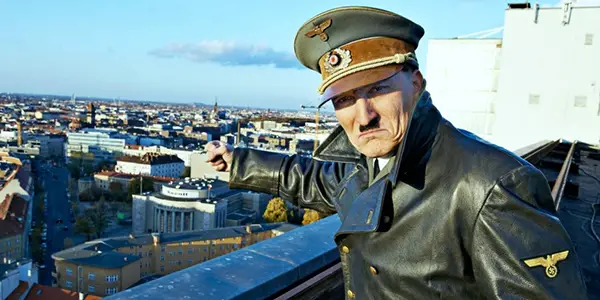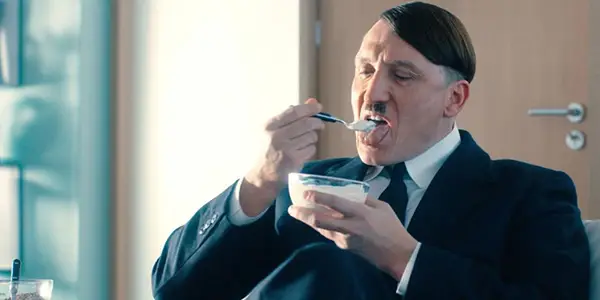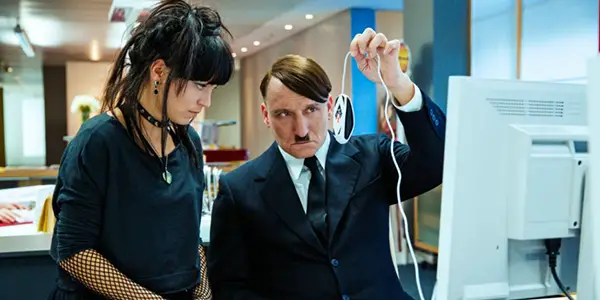LOOK WHO’S BACK: A Misguided Political Satire

Joseph is an Austro-American media and communications student currently living…
There currently is a radical change in our political landscape. The United States has drawn worldwide attention on the upcoming decision between Hillary Clinton and Donald Trump for the position of President. The United States is not the only country, either, as Austria is facing a similar conundrum. However, Austria suffers from its history and ties to the events of World War II. One party is repeatedly being accused as a new incarnation of the party that started it, and as such the world is watching this small country very carefully.
This fear of that era returning was echoed back in 2015, as the German-produced film Look Who’s Back (Original title: Er ist wieder da) saw the return of Adolf Hitler, who for some unexplained reason awakens in the 21st century. The film is an adaptation of the book written by Timus Vermer from 2012, but also takes cues from Sacha Baron Cohen‘s Borat. Adolf Hitler, played by Oliver Masucci, interacts with people on the streets of Germany to catch their reactions towards this character’s supposed return. Director David Wnendt tries to create a political satire that alludes to modern political failings, but lacks any cohesion to truly cement these perspectives.
A Concept Lost In Adaptation
Adolf Hitler living in a modern society is a genius concept that has proven quite successful for the original book Look Who’s Back, which became a best-seller in Germany. The plot is simple: Hitler suddenly wakes up in 2014, or 2011 in the book, and tries to regain his once considerable influence. Throughout the entire story, we learn that no one believes he is the real Adolf Hitler, which makes sense, as it would be ridiculous that he would somehow land in the modern era after his confirmed suicide.
Following his antics in modern Germany should have been the main focus of this film, but it sidetracks with its secondary protagonist, Fabian Sawatzki (Fabian Busch). After getting fired from the fictional German television network myTV, he seeks to redeem himself by going on a road trip with Hitler to see if he can get his old job back.

The myTV station is full of recurring characters that play an integral part throughout the film. Most notably is the character of Christoph Sensenbrink (Christoph Maria Herbst), who is trying to become the CEO of the company. He feels betrayed by his boss, who announced Katja Bellini (Katja Riemann) as his successor instead of him, which infuriates him.
The film comes to a grinding halt as soon as the focus is on the TV station rather than Hitler, as this story is simply not that interesting in comparison. Moreover, in the middle of the film, it goes full-on Borat, as it showcases how people simply joke around and take pictures with a man who they believe is a method actor portraying Hitler. It constantly switches between these two stories, destroying the illusion that these are real people that Hitler is interacting with. Instead, the results simply make everything feel staged, and the true meat of the film is nothing but a short montage.
A Satire Without Subtlety
I will confess that at the beginning of Look Who’s Back, I could not help myself but laugh, as Oliver Masucci was fantastic in the role. He played it completely seriously, which makes sense as he is not meant to be a parody of the character. Some of the comments he makes about modern society were quite dark in humor, especially his disdain for the fact that Poland was still a country.
I would have loved to watch an entire film of him just travelling Germany, and see how he would interact with people, or even politicians. Instead, he visits a fictional political party that is trying to keep his very own alive, which just randomly appears out of nowhere and never truly leads to anything except for him deciding to start a brand new one. This subplot does not even leave an impact on the story, as it just randomly occurs mid-film after he starts getting more and more media attention.
The satire at first seems rather political, considering the character, but then suddenly shifts towards media. The character of Sensenbrink tries to get rid of his competition by introducing Hitler during a fictional political satire show, which was quite a lazy over-the-top interpretation of such a show. Yet instead of ruining her, Hitler gives a speech about how media is destroying society, which is ironic considering Hitler’s own fascination with media, and everyone just laughs it off.
In the end, he becomes a modern TV icon in Germany, because everyone believes he is just an actor dedicated to the role. Naturally, this entire part is staged, and when put in contrast with the “real” people, which was heavily advertised as the focus of the film, it showcases a lack of any kind of subtlety.

Media is shown to focus only on numbers and viewership in Look Who’s Back, while politics is simply corrupt. The only thing that actually could have pushed the political message forward is the character of Hitler. He is shown to be as corrupt as he once was, but compassionate about his country. It creates an interesting juxtaposition that is never followed up on, as they simply try to modernise the reason he became as popular as he once did.
The way people react towards Hitler’s new-found existence tries to echo the real-life events from the 1940s, but does not look at how the modern era has also changed mentalities. It only paints a one-sided picture outside of one man vocally cursing the actor out, as everyone simply falls in love with him, or at least wants to take a selfie with him. It does not help that the scenes at the network are very bland. As someone who actively watches German television, it felt like I was just watching an episode of the German equivalent to The Office, Stromberg, which coincidentally also heavily featured Christoph Maria Herbst.
A Lost Potential
Look Who’s Back feels like a made-for-TV film that somehow got an official release in cinemas. There was a lack of direction, as it tried to balance being a political satire, a representation of the real world, and just being a story about Adolf Hitler waking up in 2014. Somewhere along the road, it seems this film lost its identity of what it truly wanted to be.
Personally, I think it is a shame, as the first 15 to 20 minutes of the film were quite enjoyable. However, as soon as the story goes away from its titular character, it feels lost. Especially at the end, I felt like the film did not deserve its sudden dark and twisted message of modern politics. It blatantly tells us what we were supposed to realise throughout the film, as if we did not understand it.

The film also includes two actors that have already portrayed the character of Adolf Hitler in other projects. Most notably, Christoph Maria Herbst played a hilarious rendition of the character named Hatler in the German comedy Der Wixxer. There even is a brief mention in the film of these different adaptations of him, but it is never fully explored. As I mentioned earlier, this concept is genius, but for some reason it is never truly explored to its fullest. Just imagine a Mystery Science Theater 3000 moment with Hitler watching spoofs of himself. In the end, it felt like the satire of the character had more to say than this film managed to do.
They had a great actor in the form of Oliver Masucci, whose performance is on point throughout Look Who’s Back, but it felt like no one knew what to truly do with him. A political satire is difficult, as one has to balance the comedy aspects with the heavy commentary, but this film sadly does not accomplish this. It suffers from force-feeding its message, any lack of subtlety, and an identity crisis as a film.
One sequence pretty much summarises how I feel Look Who’s Back was handled: Hitler stares out into the open, states how beautiful it is and then just throws a plastic cup to the ground.
Have you had the chance to see Look Who’s Back? If yes, what did you think of it? Are there any films that you think are good political satires?
Look Who’s Back, or Er Ist Wieder Da, was released in October 2015 in German theaters. Find international release dates here.
Does content like this matter to you?
Become a Member and support film journalism. Unlock access to all of Film Inquiry`s great articles. Join a community of like-minded readers who are passionate about cinema - get access to our private members Network, give back to independent filmmakers, and more.
Joseph is an Austro-American media and communications student currently living in Austria, who grew up with film most of his life. Having won a new appreciation of cinema as an art form and as an industry, he aims to learn as much about it as he can.













